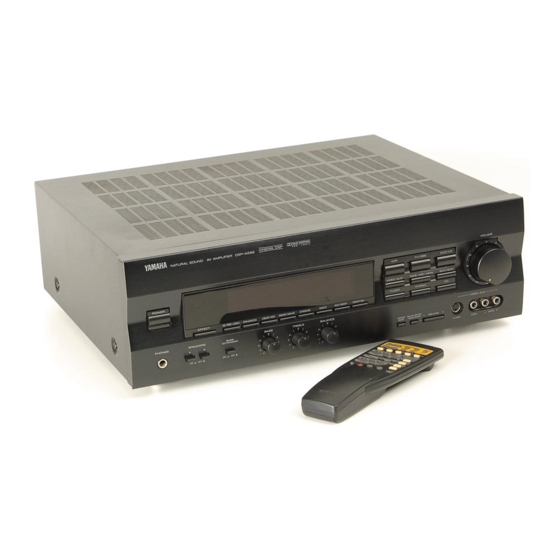Yamaha DSP-A592 Руководство пользователя - Страница 3
Просмотреть онлайн или скачать pdf Руководство пользователя для Усилитель Yamaha DSP-A592. Yamaha DSP-A592 34 страницы. Natural sound av amplifier

FEATURES
5 Speaker Configuration
DSP-A592
Main:
70W + 70W (8Ω) RMS Output
Power, 0.04% THD, 20-20,000 Hz
Center: 70W (8Ω) RMS Output Power,
0.07% THD, 1 kHz
Rear:
35W + 35W (8Ω) RMS Output
Power, 0.3% THD, 1 kHz
DSP-A492
Main:
65W + 65W (8Ω) RMS Output
Power, 0.04% THD, 20-20,000 Hz
Center: 65W (8Ω) RMS Output Power,
0.09% THD, 1 kHz
Rear:
20W + 20W (8Ω) RMS Output
Power, 0.7% THD, 1 kHz
Digital Sound Field Processor
Dolby Pro Logic Surround Decoder
Theater-like Sound Experience by the
Combination of Dolby Pro Logic and
YAMAHA DSP Technology (CINEMA DSP)
Automatic Input Balance Control for
Dolby Pro Logic Surround
CONTENTS
Supplied Accessories ......................................2
Caution ............................................................4
........................................................................5
Profile of This Unit ...........................................6
Speaker Setup ................................................7
Connections ....................................................8
Controls and Their Functions ........................15
Thank you for selecting this YAMAHA AV Amplifier.
Test Tone Generator for Easier Speaker
Balance Adjustment
3 Center Channel Modes
(NORMAL/WIDE/PHANTOM)
Video Signal Input/Output Capability
SLEEP Timer
Remote Control Capability
DSP-A592 only
BASS EXTENSION Switch for Reinforcing
Bass Response
6-Channel Discrete Input Terminals for
Connecting with a Dolby Digital (AC-3)
Decoder
Two S VIDEO Output and One S VIDEO
Input Terminals
Auxiliary Audio and Video Input Terminals
(Including a S VIDEO Terminal) on the
Front Panel
Speaker Balance Adjustment ........................20
Basic Operations ...........................................23
......................................................................27
Setting the SLEEP Timer ..............................31
Troubleshooting .............................................32
Specifications ................................................33
3
